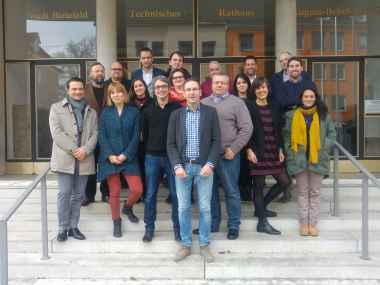The task to create the future – vision building and setting priorities in urban mobility development
Edited on
06 March 2017Just last week, 15th – 17th of February, CityMobilNet partners met at the premises of their Lead Partner, the City of Bielefeld. The joint challenge was to make the leap from gathering knowledge and data on the state of play of urban mobility to working on the vision and priorities of its very future development. Thanks to the data assessment and analysis, many have a good idea of the problems at stake. The main issues for the joint work were highly interesting and demanding at the same time: how to set up the process for visionary work, how to integrate the often contrasting views of stakeholders and which experiences do cities in and outside the partnership have to provide. Our special thanks go to Clémetine Gravier of the URBACT Secretariat, our programme expert Ania Rok and Heike Mages from the German/Austrian National URBACT Point for supporting us during our meeting!

Creating a joint vision and common priorities wrapping up the diverse and contrasting demands and views of many stakeholders is a highly difficult challenge. CityMobilNet started into this task with first having a thorough look at the state of play: our cities presented and discussed their data assessment and how they came and are yet to come to the basis for the future steps: sufficient knowledge on the current urban mobility situation.
Based on this, a set of three workshops led all partners to the new challenge of vision building, identifying priorities and setting suitable targets to these with a clear focus on “how to design the process”.
The first workshop took all partners to the situation of a city right at the start of the task called “Anytown”. Within two working groups, our cities developed a process on how to design vision building and setting priorities as well as whom to involve and how and when. Additionally, an example for this city’s vision and priorities was created to showcase how the process could work out.
The second workshop left the track of working on fictional cases: The partners City of Burgos and Metropole Aix Marseille Provence served as Case Studies for a Peer Review exercise of their former SUMP development process – highlighting aspects on vision building and setting priorities and targets. CityMobilNet partners followed these reviews according to the Peer mostly matching their situation.
Third, but not least, the lessons learnt from the two first workshops were put into practise by a future dialogue exercise: in two groups, partners were asked to come to a joint vision for one of our cities’ situation and to rethink which barriers they meet when realising the vision. To give all partners the notion of how it will be to work with stakeholders’ different demands and views, each partner was assigned with a different stakeholder role bringing in these specific views and demands. The results could hardly have been more different: while one working group arrived thanks to harmonious work easily at both – the joint vision and ideas on how to overcome barriers for implementation – the other faced heavy difficulties due to the strong and contrasting views of the present stakeholders.
With the impressions and experiences gained from our second seminar, the task is now up for the local ULG work to make use of our capacities for setting up vision building, prioritisation together with suitable targets.
Already beginning of April 2017, CityMobilNet will perform its third seminar: we will have a look at the progress and difficulties met so far while creating the view on the future urban mobility development. And we will start thinking on which kind of measure packages will be needed to go for the achievement of our freshly defined targets and priorities.
Submitted by Olaf Lewald on
